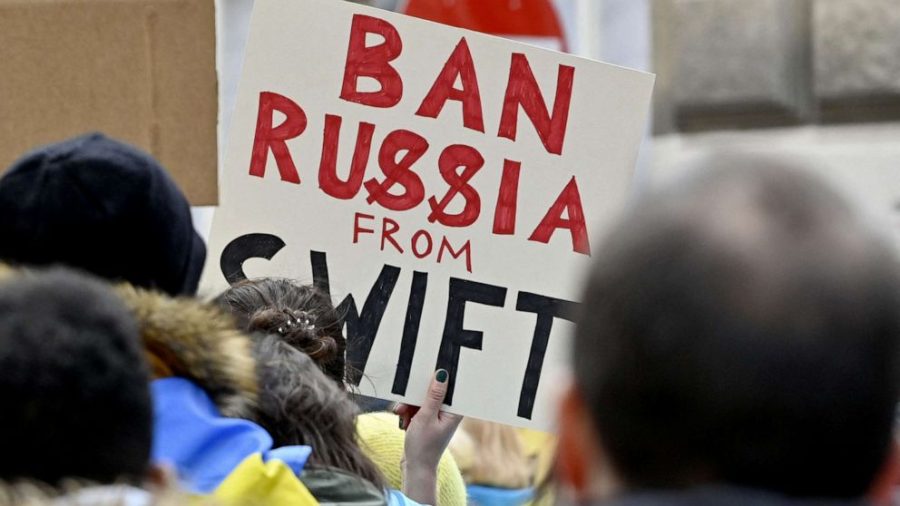Sanctions on Russia: what they are, what they do and what effect they will have on countries around the world
Credit: Hans Punz
Protest signs urges a ban of Russia from the SWIFT financial system, an action that has since been taken by the United States and various other NATO countries.
March 8, 2022
The word “sanction” has become an essential in the vocabulary of most Americans this past week as the Russo-Ukrainian conflict continues to rage on. In lieu of military intervention, the United States, Canada, and many European and Middle Eastern countries have placed sanctions on the aggressor: Russia.
According to the Council on Foriegn Relations, “Economic sanctions are the withdrawal of customary trade and financial relations for foreign- and security-policy purposes.”
Sanctions can take on many other forms, however, including, “asset freezes, arms embargoes, capital restraints, foreign aid reductions, and trade restrictions,” wrote Mathers.
When it comes to Russia, the Biden Administration has targeted resources integral to Russia’s economic strength with sanctions.
In a joint statement from the United States, European Commission, France, Germany, Italy, the United Kingdom and Canada, further “restrictive economic measures” were listed.
First, a commitment “to ensuring that selected Russian banks are removed from the SWIFT messaging system.”
Second, “a commitment to imposing restrictive measures that will prevent the Russian Central Bank from deploying its international reserves in ways that undermine the impact of our sanctions.”
Third, a commitment “to acting against the people and entities who facilitate the war in Ukraine and the harmful activities of the Russian government.”
Fourth, a commitment “to launching this coming week a transatlantic task force that will ensure the effective implementation of our financial sanctions by identifying and freezing the assets of sanctioned individuals and companies that exist within our jurisdictions.”
“Finally,” the statement read, “we will step up or coordination against disinformation and other forms of hybrid warfare.”
Sanctions can also be placed on individuals, which the United States has done to many of Russian president Vladimir Putin’s allies. The U.S. and other European countries, however, have yet to sanction Putin himself.
It should be considered, as well, the effects that sanctions will have on the world and the economies of various countries.
Many countries rely heavily on Russia’s oil and gas exports, and sanctions on these resources have caused their prices to rise significantly. There is also fear over what Russia could do with the power they hold over their supply.
“So far the sanctions have not targeted the energy sector directly, but traders fear that Moscow could retaliate by restricting oil and gas exports,” said the article “How could Russia sanctions impact you?” from Germany’s international broadcaster, Deutsche Welle (DW).
Many are also concerned that when it comes to Russia’s removal from the SWIFT banking system, buying Russian oil and gas will become “prohibitively cumbersome,” DW wrote.
Also, though not as important to American imports, Egypt and many Middle Eastern countries rely on Russia for a significant percentage of their food supply.
According to DW, “Russia and Ukraine together account for about 30% of global wheat exports, nearly a fifth of the corn trade, and about 80% of sunflower oil exports.”
The impact these sanctions will have on the food supply could have detrimental effects on countries who are already struggling with food crises.
So, how exactly are these sanctions affecting Russia and the invasion in Ukraine?
On Thursday, Feb. 24, United States President Joe Biden said, “This is going to impose severe cost on the Russian economy, both immediately and over time. We have purposely designed these sanctions to maximize a long-term impact on Russia, and to minimize impact on the United States and our allies.”
These sanctions threaten the structure of Russia’s place in the world’s economy.
According to Phil McCausland from NBC “In total, the sanctions will keep approximately $1 trillion in Russian banking assets from flowing through the markets of the U.S. and its partners’ financial systems. The sanctions also limit tech exports to Russia and squeeze the country’s tech industry.”
The Russian stock market is crumbling and making the ability to conduct business in the country harder. The value of the ruble, Russian currency, has also hit an all-time low as a result of the sanctions. Many world powers hope that this will discourage the Russian invasion of Ukraine.
McCausland wrote, “The 2014 sanctions that were placed on Russia after it annexed Crimea were effective, according to the International Monetary Fund, in the sense that penalties along with low oil prices slowed Russian economic growth in the ensuing years compared to other nations.”
After the effects of these sanctions, Putin backed off for the following eight years. Now, it is a question of whether or not these sanctions will have the same effect.












